The Hoya ( common name is Waxflower ) is a climbing plant for temperate and warm climates. There are quite a few species, but all have colourful waxy flowers and waxy thick green leaves. The Hoya can be grown outside in a suitable spot preferably out of the full sun, but in a spot that gives the plant lots of natural light, as it flowers well in these conditions. I have grown Hoyas successfully in a position with morning sun, and good light throughout the day. The plants need a well drained soil, and don't mind being potbound with their roots restricted. They are epiphytes and grow naturally in places like tree canopies, in the forks of trees where they survive on rainfall and leaf litter from above. Hoyas flower from the same flower nodes each year, so be careful not to cut the nodes off !!
This Hoya was photographed growing on the balcony of a Sydney apartment.
General tips for all Hoya Plant Care
Hindu Curly Rope Hoya
The Curly Rope Hoya is a harder-to-find carnosa.
Never cut the long tendrils! Leaves and flower clusters develop from these.
Propagate Hoya plants from stem cuttings or by air layering.
Hoyas don’t mind being a bit root bound. Keep in the same pot for years, but remember to fertilize throughout spring and summer.
All Hoyas need to be potted in planters with drainage. These plants are very sensitive to too much water, so be sure to use a well draining soil with plenty of pumice and/or perlite.
Downvoting a post can decrease pending rewards and make it less visible. Common reasons:
Submit
Hoya carnosa, the porcelainflower or wax plant, is an Asclepiad types of blossoming plant in the dogbane family Apocynaceae. It is one of the numerous types of hoya that are local to Eastern Asia and Australia. It is a typical house plant developed for its alluring waxy foliage, and sweetly scented blooms.
Despite the fact that numerous swear Hoya plant mind is among the most effortless of every single indoor plant, we've looked after numerous Hoyas in the nursery throughout the years, and have discovered that every ha its particular preferences. Here are 5 of our most loved Hoya cultivars and their care prerequisites. We'll travel through from most to slightest normal, so you can ace the intricate details of Hoya plant mind. Furthermore, we'll share a tip to initiate blooming.
The blooms are normally light pink, yet may differ from close white to dull pink; they are star-molded, and are borne in bunches that resemble modest wax miniatures. The surface of the blossoms is canvassed in minor hairs giving them a fluffy sheen. They are intensely scented and may deliver abundance nectar that dribbles from the blossoms. Like all Hoyas, this species blooms from particular perpetual structures alluded to as goads. These show up from the axils of the leaves and stem; blooms may not be delivered when the goads initially show up, but rather in time buds rise up out of the tips. Each season new blooms are created on these same goads, so they ought not be harmed or expelled.
H. carnosa has been in development for over 200 years and has offered ascend to numerous cultivars that change in foliage shape or bloom shading. In development in the UK it has picked up the Royal Horticultural Society's Award of Garden Merit.
Late investigations at the University of Georgia have indicated H. carnosa to be a fantastic remover of toxins in the indoor condition.
https://images-na.ssl-images-amazon.com/images/I/51F9BpI4ryL.SX355.jpg
Downvoting a post can decrease pending rewards and make it less visible. Common reasons:
Submit
Congrats, you won the Silly Sausage Award for your comment. Great pics and info. Well done !!
Downvoting a post can decrease pending rewards and make it less visible. Common reasons:
Submit
Native to southern India, highly prized, and the subject of legend. You’ll find Hoyas throughout eastern Asia to Australia and classified botanically in the asclepias (milkweed) family. The exact number of species is a mystery. Bailey’s Standard Cyclopedia of Horticulture estimates there are 100 species. Listed at the end of the article are over 550 recoginized species. The most common species, and the one most often seen and grown as a houseplant is Hoya carnosa and Hoya carnosa variegata.
In a sunny window the foliage is unusually decorative, and their late spring and summer flowers are highly prized. Some consider Hoya blooms among the most exquisite creations of nature, seemingly fashioned from ivory or porcelain, with glimmering centers of ruby and amethyst. The blossom of Hoya carnosa carries a delicate, elusive fragrance which is barely noticeable. The waxen ball of five-pointed, double stars, is geometrically perfect; giving the bloom an artificial look. Those experiencing Hoya carnosa for the first time are pleasantly surprised to find it is real.
Details found via : https://plantcaretoday.com/hoya-plant-care.html
Downvoting a post can decrease pending rewards and make it less visible. Common reasons:
Submit
Congrats, you will share the Fav. comment Award with one other. Nice pics of Hoyas and good info. Well done !!
Downvoting a post can decrease pending rewards and make it less visible. Common reasons:
Submit
Thank you very much @ctrl-alt-nwo.
Downvoting a post can decrease pending rewards and make it less visible. Common reasons:
Submit
The name “Hoya” honors Thomas Hoy, gardener to the Duke of Northumberland and the first to bring this superb house plant into prominence.
The exact number of species is a mystery. Bailey’s Standard Cyclopedia of Horticulture estimates there are 100 species. Listed at the end of the article are over 550 recoginized species. The most common species, and the one most often seen and grown as a houseplant is Hoya carnosa and Hoya carnosa variegata.
Thick leaves of green, rimmed with red and white, and a waxen texture from which it derives the nick-name “wax plant.”
Some consider Hoya blooms among the most exquisite creations of nature, seemingly fashioned from ivory or porcelain, with glimmering centers of ruby and amethyst. The blossom of Hoya carnosa carries a delicate, elusive fragrance which is barely noticeable.
Source
Downvoting a post can decrease pending rewards and make it less visible. Common reasons:
Submit
Congrats, you will share the Fav. comment Award with one other. Nice pics and good info. Well done !!
Downvoting a post can decrease pending rewards and make it less visible. Common reasons:
Submit
Has Fav. Comment reduced to 15%?
Downvoting a post can decrease pending rewards and make it less visible. Common reasons:
Submit
Hoya Plant Information
✦ Plant Type: Evergreen perennial
✦ Growth Habit: Vine (climbing, trailing), shrubs
✦ Other Names: Wax plant, wax flower
✦ Native to: India, China, Thailand, Malaysia, Indonesia, Philippines, Polynesia, New Guinea, and Australia
✦ USDA Hardiness Zone: 10-12
✦ Light Requirement: Sun in the morning hours and bright, indirect light for the rest of the day
✦ Watering: Average; avoid excessive watering
✦ Soil: Well-drained soil; Alkaline/neutral/acidic
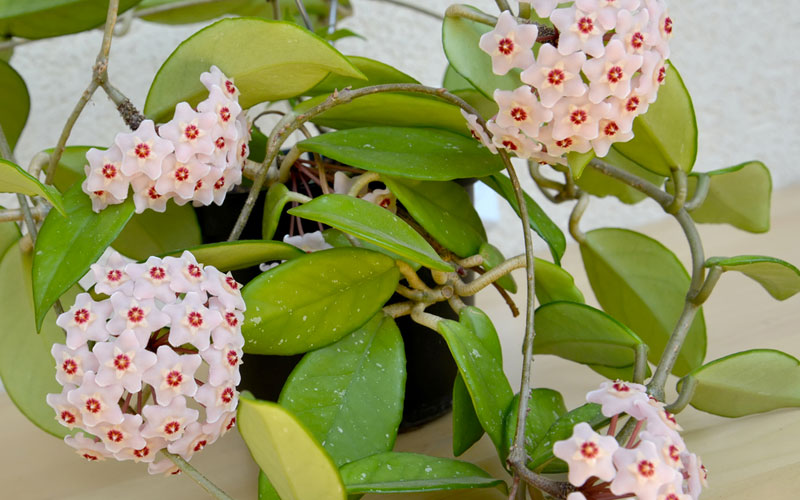
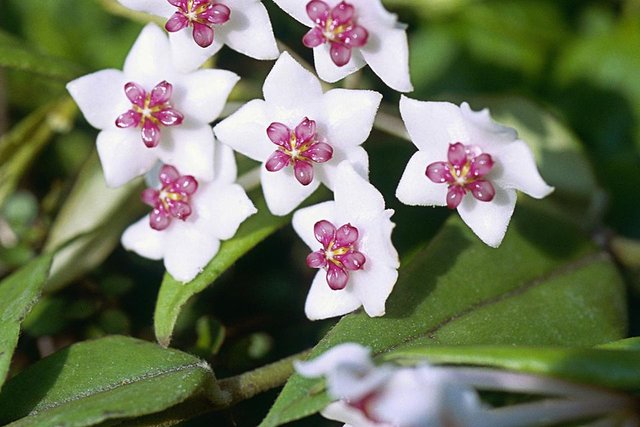
op.jpg)
✦ Flowers: Star-shaped flowers that grow in clusters
✦ Flowering Season: Throughout the summer
✦ Colors: White, pink, cream, yellow, orange, etc.
✦ Foliage Color: Green
✦ Other Characteristics: Some species might be toxic to livestock
Downvoting a post can decrease pending rewards and make it less visible. Common reasons:
Submit
The Hoya plant, also known as the Hindu Rope or Wax plant, has been enjoyed for years and is very popular among many home gardeners. It's a vining plant with thick, waxy looking leaves and can produce beautiful flowers. Many people like to grow them in hanging baskets. The Hoya plant has wheel-like clusters of porcelain or waxy flowers. The flowers typically have stars in their crowns and often produce a unique, enjoyable fragrance.�
Light: Bright indirect light year-round. Hoyas will live in low light, but will not bloom. It's also important to give them darkness at night. Plants need a rest, too. Once your plant has formed flower buds, don't move it around. Changes in light levels can cause flower buds to shrivel up or fall off before they open.
Water: Water spring through fall, allowing soil to dry out a bit between waterings. Flowering Hoya plants are thirsty, but don't like to sit in soggy soil. Use room-temperature water for your tropical plants. Cold water can shock them. In winter, water sparingly giving the plant just enough to keep the soil from drying out.
Fertilizer: Feed monthly spring through fall with an organic, diluted liquid fertilizer. 🌿🌸💚
Commonly Grown Hoya “Species”
Hoya australis – has huge, waxen, deep-green leaves measuring nearly four inches across, and splotched with silver. It is a vigorous, strong grower, vining kind with distinctly fragrant flowers, pink with red crowns.
Hoya bandaensis – Sturdy plant with deep-green glossy leaves.
Hoya bella – is a handsome dwarf, small growing species with slender upright branches that droop down as they age; a non climber, small leaves are thick, dark green; flowers are white with purple centers. An old favorite.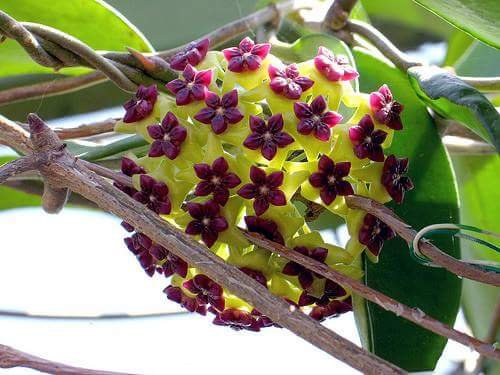 thanks to sharing for your valuable post of hoya plant..very well done..my dear friend.. @ctrl-alt-nwo
thanks to sharing for your valuable post of hoya plant..very well done..my dear friend.. @ctrl-alt-nwo
Downvoting a post can decrease pending rewards and make it less visible. Common reasons:
Submit
Very nice pics !!
Downvoting a post can decrease pending rewards and make it less visible. Common reasons:
Submit
thank you my dear friend.your encouraging word may very quickly success in my future... again thanks for your great work..my dear friend @ctrl-alt-nwo take care yourself...
Downvoting a post can decrease pending rewards and make it less visible. Common reasons:
Submit
The genus Hoya was named by Robert Brown, a Scottish botanist and palaeobotanist who is well-known for his contributions to the field of botany, especially plant taxonomy. This genus comprises more than 200 species of tropical plants. Several species belonging to this genus produce beautiful, sweet-scented flowers that appear in clusters. Though many species are twining vines, some might grow as shrubs. Some of the species can be epiphytes. Epiphytes should not be mistaken for parasitic plants. Though epiphytes grow on other plants, they get nutrients and moisture from air and rain. There are some species that start as terrestrials but turn into epiphytes later.
Hoya plants are also referred to as wax plants, wax flowers, or wax vines due to their waxy foliage and porcelain-like blooms. When cut, clear or milky sap oozes out. While gardening enthusiasts might marvel at the variety of blooms that the different varieties or cultivars offer, some of the varieties also produce ornate leaves. For instance, Hoya kerrii, which is called the Sweetheart Plant or Sweetheart Hoya, is popular due to its heart-shaped leaves.
Hoya Plant Information
✦ Plant Type: Evergreen perennial
✦ Growth Habit: Vine (climbing, trailing), shrubs
✦ Other Names: Wax plant, wax flower
✦ Native to: India, China, Thailand, Malaysia, Indonesia, Philippines, Polynesia, New Guinea, and Australia
✦ USDA Hardiness Zone: 10-12
✦ Light Requirement: Sun in the morning hours and bright, indirect light for the rest of the day
✦ Watering: Average; avoid excessive watering
Very popular among gardening enthusiasts, Hoya carnosa has thick, glossy leaves that are about 6-10 cm in length and 4-6 cm in width. The plant can grow up to a height of 15 feet. Its popularity is often attributed to its sweet fragrance. Each umbrel has about 20-30 flowers.
Downvoting a post can decrease pending rewards and make it less visible. Common reasons:
Submit
If you remember a vine creeping around your grandmother’s kitchen, chances are it was a Hoya plant. This tropical indoor plant — often called a “Wax plant” due to its thick waxy leaves — is a classic because it lives forever, grows to be enormous, and creates beautiful, porcelain-like fragrant flower clusters (it’s also often called “Porcelain flower”).
Hoya (family Asclepiadaceae) A genus of twining and root-climbing plants that have fleshy leaves and flowers which are waxy, highly fragrant, showy, and borne in umbels. They are delightful hothouse ornamentals. There are about 90 species, native from southern China to the Pacific.
The Hoya must be mature (3+ years old) in order to bloom! It will need bright diffused light at the very least, but as stated above, a bit of direct sun is beneficial. If age and light are on your side, you can also encourage flowers by keeping your Hoya in a snug pot and not disturbing the roots too much. And of course, don't cut those peduncles! Once in bloom, absolutely do not repot, mist the plant, or move it around often, or it will be more likely to drop it's blooms. Given the right conditions, your Hoya is likely to provide you with nectarous blooms year.
Source:https://www.stamenandstemblog.com/blog/hoyacarnosa
Downvoting a post can decrease pending rewards and make it less visible. Common reasons:
Submit
Hoya the beautiful flowers which is commonly known as waxflower. Mainly hoya is an ancient greek and used in certain Biblical quotations.
source
The flowers are light pink and white to dark pink. It's the flower of Australia, Asia including India, China, Thailand, Malyaysia, Viet Nam, Indonesia and Philippines.
source
source
Flowers is the beauty of nature and i love flowers. We can learn many things from flowers like purify our mind, pure love and peace.
Downvoting a post can decrease pending rewards and make it less visible. Common reasons:
Submit
Hoya is a genus of tropical plants in the Asclepiad family. Most people when they think of Hoyas they automatically think of Hoya carnosa, more commonly known as ìGrandmaís Old Fashioned Wax Plantî, and let it rest at that.
ORobert Brown named Hoya in honour of his friend and fellow botanist Thomas Hoy, who was employed as head gardener by Duke of Northumberland at his estate, Sion House. There is no record of Thomas Hoyës ever having grown a Hoya but then he, being a gardener must have, seen that his boss collected rare tropical plants.
Downvoting a post can decrease pending rewards and make it less visible. Common reasons:
Submit
The blooms of this plant are perfectly geometrical, which is one of the reasons that the plant looks artificial upon first glance. I never knew much about Hoyas; in fact, I only recently learned their true name. They are breathtaking beauties that are in many homes. They are easy to take care of and they add an exotic touch to any home garden. Here’s some of what I’ve learned about this extraordinary plant.
The worst pest that will bother your Hoya plant is the root-knot nematode. These little pests seek out plants in areas that have warm temperatures year round. Locations where there is no fear of frost occurring suddenly overnight. If your Hoyas are infected, they will begin to decline in health. In many cases, these nematodes can be the death of the plant, but you can save it by taking a cutting from the top of the plant ant attempting to propagate it.
Source
Downvoting a post can decrease pending rewards and make it less visible. Common reasons:
Submit
Magoo-2 found a series of multi accounts of a same owner is following your articles to cheat your generous rewards.
Magoo-2 found these accounts are suspicious & can be multi accounts of a single owner. Conclusion is based on last 30 days transactions:
@abdulmanan
@johnjohny
@bablibablu
@mudasraraza
@mudasra
magoo-2
Check our latest multi comment spam update report
Downvoting a post can decrease pending rewards and make it less visible. Common reasons:
Submit
@magoo-2 so brother will you not stop it?
Downvoting a post can decrease pending rewards and make it less visible. Common reasons:
Submit
Downvoting a post can decrease pending rewards and make it less visible. Common reasons:
Submit
@ctrl-alt-nwo, Wow...seriously better to home gardens you introduced this time the Hoya plants. Various coloring flowers there. I glad to see your better description and photo images there. You every time given opportunity to followers to search more info via internet using. I give some extra information without breaking between 200 maximum words.
Hoya vines are absolutely stunning indoor plants. These unique plants are native to southern India and named after Thomas Hoym, the Duke of Northumberland’s gardener and the grower that brought attention to the Hoya. The Hoya climbing vine is easy to care for in most home situations provided they get plenty of indirect light and high humidity. These are long lived plants that prefer cramped growing conditions. With a little attention and knowledge on how to care for Hoya, these plants can be passed down from generation to generation.
Hoya plants should be kept out of the high light of the day, as this may burn the leaves. They need bright light but indirect. Water the plant frequently enough in spring and summer that the soil is kept moist. Misting is also a good idea unless the plant is kept in the bathroom where shower steam will keep the air humid.
Hoya in winter do not need as much water as in summer. Wait until the top few inches of soil are dry. Mist plants that are near drying furnaces or other heat sources several times a week to increase humidity. Alternatively, Hoya climbing vine can have its container set on a saucer filled with small gravel and water to increase moisture around the plant without getting its roots sodden. Fertilizing is not part of wax plant care in winter.
Thank you for given best gardening post again. You inspire our world.
Images found on google
Content source: https://www.gardeningknowhow.com/ornamental/vines/hoya-wax-plant/growing-hoya-wax-vines.htm
Downvoting a post can decrease pending rewards and make it less visible. Common reasons:
Submit
Really great pics !!
Downvoting a post can decrease pending rewards and make it less visible. Common reasons:
Submit
Hoya A genus of twining and root-climbing plants that have fleshy leaves and flowers which are waxy, highly fragrant, showy, and borne in umbels.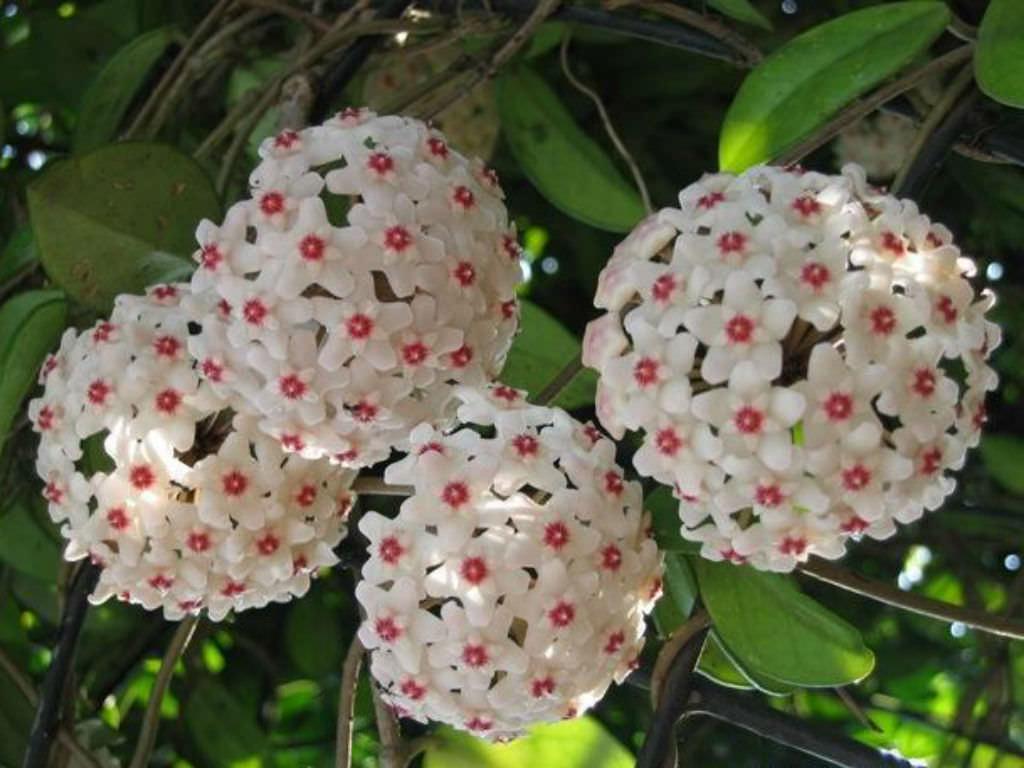
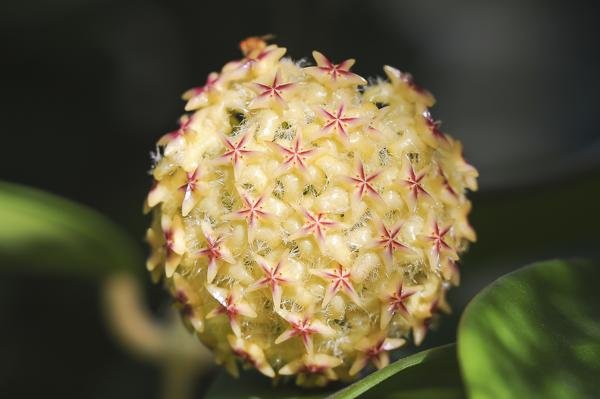
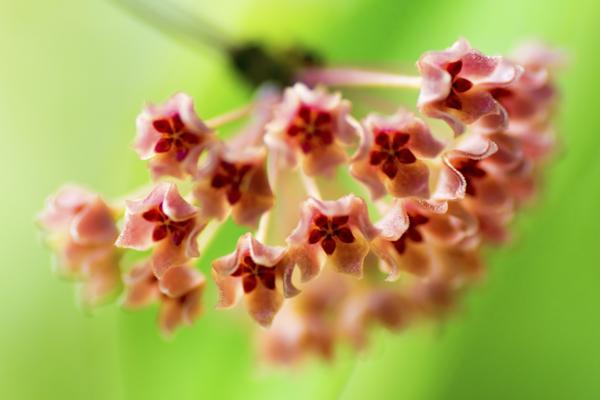

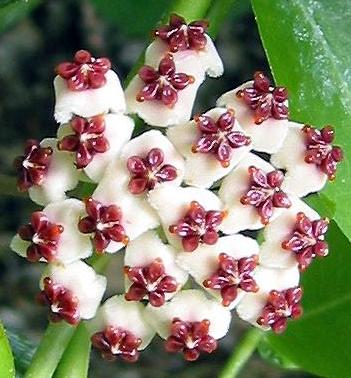 The hoya really demands attention when it flowers, and it truly is hard not to be in awe while admiring the up-to 40 small flowers adorned upon each umbrella-shaped peduncle they bloom from.
The hoya really demands attention when it flowers, and it truly is hard not to be in awe while admiring the up-to 40 small flowers adorned upon each umbrella-shaped peduncle they bloom from.
Hoya flowers grow in a ball-shaped cluster, similar to mophead hydrangeas. Each cluster may contain up to 40 individual flowers, packed tightly together.
You can grow the hoya if you live in USDA growing zones 10-12, elsewhere you must grow it as a tropical container plant or greenhouse specimen.When your hoya plant finishes blooming, leave the flower stalk, as it may produce new flowers.
Place your hoya plant in a hanging basket where you can admire it from your favorite seat on the deck or porch. Hoya plants will cling to a small trellis, providing a vertical accent in your tropical container garden.
The Hoya plant is an unbelievably unique plant and it is as unbelievably easy to grow. It comes from the milkweed (asclepiadaceae) family. It has cascading vines and waxy, green leaves. It can be trained as a vine or grown in a hanging basket. It is an asexual plant.
Source of info-https://dengarden.com/gardening/Hindu-Rope-Plant-Hoya-Carnosa-Compacta
Downvoting a post can decrease pending rewards and make it less visible. Common reasons:
Submit
Hoya vines are absolutely stunning indoor plants. These unique plants are native to southern India and named after Thomas Hoym, the Duke of Northumberland’s gardener and the grower that brought attention to the Hoya.
The Hoya climbing vine is easy to care for in most home situations provided they get plenty of indirect light and high humidity. These are long lived plants that prefer cramped growing conditions. With a little attention and knowledge on how to care for Hoya, these plants can be passed down from generation to generation.
Among the picturesque names for Hoya are wax plant and porcelain flower. This is a tropical plant, best suited to indoor growing in all but the warmest climates. The flowers may be a rarity in home situations but, if you get lucky, the delicate flowers present a perfect display that almost looks too good to be real. Hoya is a terrific plant for a beginner gardener to learn indoor plant care. There are over 2,000 plants in the Hoya genus. That said, Hoya carnosa is the most commonly cultivated for home growing. Interestingly, it is in the Milkweed family, the same family of plants that are the main sustenance for Monarch butterflies.
source
Downvoting a post can decrease pending rewards and make it less visible. Common reasons:
Submit
History Of The Hoya Plant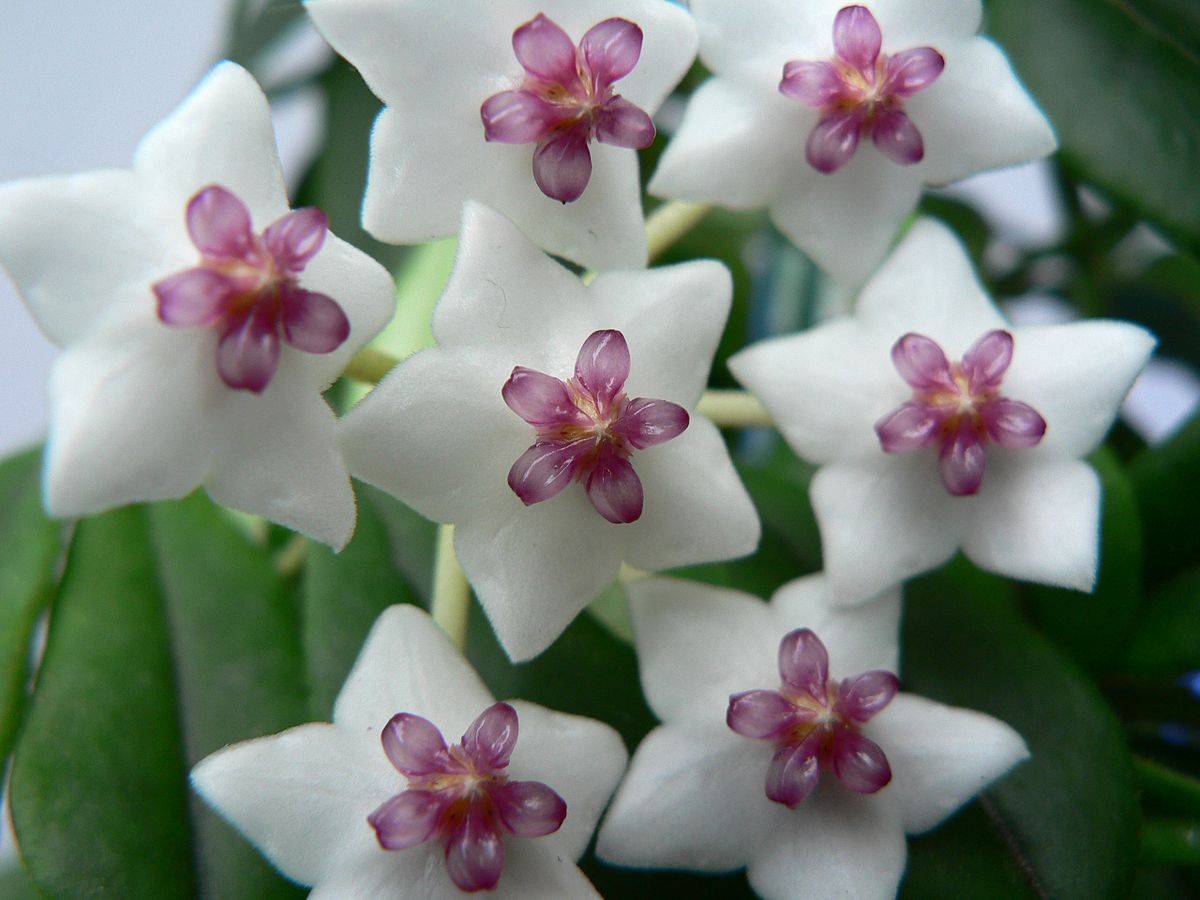
The name “Hoya” honors Thomas Hoy, gardener to the Duke of Northumberland and the first to bring this superb house plant into prominence.
Native to southern India, highly prized, and the subject of legend. You’ll find Hoyas throughout eastern Asia to Australia and classified botanically in the asclepias (milkweed) family.

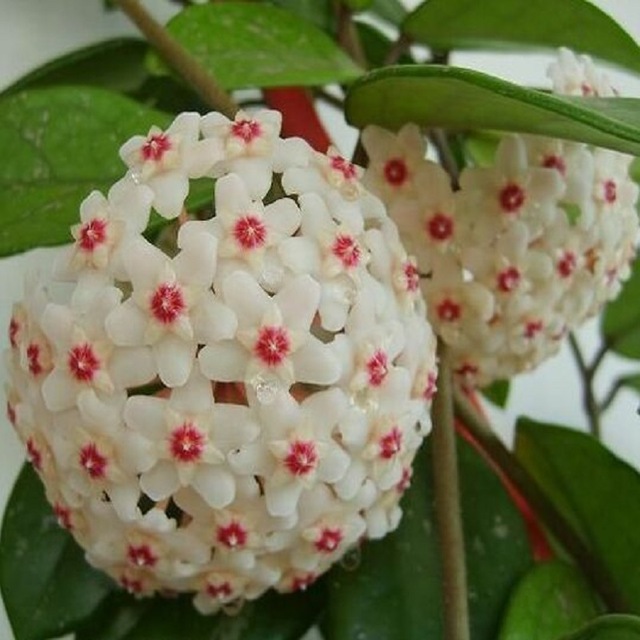
The exact number of species is a mystery. Bailey’s Standard Cyclopedia of Horticulture estimates there are 100 species. Listed at the end of the article are over 550 recoginized species. The most common species, and the one most often seen and grown as a houseplant is Hoya carnosa and Hoya carnosa variegata.
Thick leaves of green, rimmed with red and white, and a waxen texture from which it derives the nick-name “wax plant.”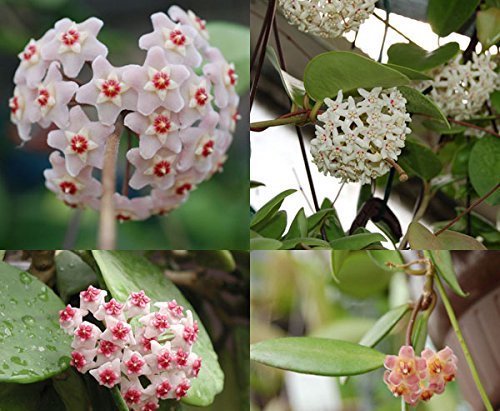
@source
Downvoting a post can decrease pending rewards and make it less visible. Common reasons:
Submit
Hoya is a vining succulent that roots along it long, branching stems. In the wild it climbs trees and scrambles over rocks, growing continuously and reaching lengths of 20 feet(6 m) or more. The leaves are smooth, thick and fleshy, up to 3 inches (7.5 cm) long, and paired on opposite sides along the stems.
Twenty or more star shaped flowers up to 0.5 inch (1.5 cm) across, typically light pink (but may vary from near-white to dark pink), are borne in pendulous convex clusters, 2 or 3 inches (5 or 8 cm) across. The leaves and the flowers are often described as “waxy”.
Hoya plants don’t ask for much, beyond the well-draining soil and the warm humid conditions that many tropical flowers crave. They don’t like wet feet or heavy soil, and as many grow as epiphytes in nature (similar to bromeliads and orchids). Give them at least a half day of sunshine, and bring them indoors when temperatures drop below 50 degrees F (10 degrees C).
When your Hoyas finishes blooming, leave the flower stalk, as it may produce new flowers. Removing the stalk forces the plant to produce a new stalk, which delays blooming and wastes the plant’s energy. They are light feeders, and a monthly drink of compost tea or dilute fish emulsion provides all the nutrition these tropicals need.
Hoyas like the security of a snug pot, and plants that are a bit root bound will flower more prolifically than those that are swimming around in a giant pot.
Source
Downvoting a post can decrease pending rewards and make it less visible. Common reasons:
Submit
Epiphytic hoya plant, also known as the wax plant, is a popular houseplant. With clusters of star-shaped flowers adorning it, this waxy-looking species survives with only the bare minimum of care.
The family of hoya plants is 200-300 different species with multiple different cultivars. Some bear gorgeous and aromatic flowers, others are vines with a wide diversity of leaf shapes. While we can’t cover it all in one piece, let’s look at a few of the most popular varieties to grow at home.
Sweet-smelling hoya carnosa is one of the most popular of the hoya plant varieties, with many different cultivars available. It has won the Royal Horticultural Society’s Award of Garden Merit for many of those cultivars, and is a phenomenal houseplant.
Originating in eastern Asia and Australia, it has waxy foliage and the star-shaped flowers common to all hoya varieties. It tends to grow as a vining plant. Reputed to be a great cleanser of indoor air pollutants, it’s a popular plant to grow.
With shiny, succulent leaves and a vining habit, the common waxflower is a common butterfly attractant in its native Australia. This hoya plant loves sunlight, growing along the edges of rainforests and on rocky outcroppings in the eastern and southern parts of its native ground.
source: here
Downvoting a post can decrease pending rewards and make it less visible. Common reasons:
Submit
Great pics !!!
Downvoting a post can decrease pending rewards and make it less visible. Common reasons:
Submit
Wax plant is a beloved trailing plant belonging to the Hoya plant family. It’s a classic beauty with fragrant clusters of star-shaped blooms. Wax plant gets its name from its thick, shiny leaves. Perfect for a hanging container, wax plant vines and drapes gracefully. It’s a popular houseplant, and in warmer climates, it can be enjoyed outdoors.
One important element in a wax plant’s native climate is warmth and sunlight. Before you rush out to buy yourself a wax plant, make sure you have an area that will provide the warmth and light it will love. And when you select a wax plant to purchase, make sure it’s nice and healthy to begin with. Inspect its foliage for signs of disease or damage. Peek underneath the leaves, too.
Wax plants are particularly sensitive to any disruption of their root ball. In fact, wax plants prefer their roots to be bound tighter than most plants would find comfortable. Avoid repotting a wax plant for as long as possible. If your plant has reached the age where it should be flowering but it isn’t, or maybe it has flowered in the past but hasn’t, try giving it more light.
Info Source:
Downvoting a post can decrease pending rewards and make it less visible. Common reasons:
Submit
Great pics !!!
Downvoting a post can decrease pending rewards and make it less visible. Common reasons:
Submit
Thanks a bunch!
Downvoting a post can decrease pending rewards and make it less visible. Common reasons:
Submit
Oh, yes, my friend, an unusually beautiful, which has an unusually bright coloring - hoya (wax ivy), with proper, and very simple care, hoya will certainly thank the beautiful, like wax flowers. Flowering hoyi will last a long time, about six months. The rules of caring for her are very simple. The whimsical beauty loves comfortable, warm weather (in summer +25, and in the winter and autumn time of the year up to +15 degrees), although the heat tolerates easily. In the summer, wax ivy can be planted on the street.
Very fond of ivy and light. The plant can tolerate direct sunlight, but when the burn is received, the leaves lose their natural color and become faded and yellowish, which will adversely affect not only the aesthetic qualities, but also the health of the ivy itself. Lack of light, too, not the best way to affect the plant - the flowers will begin to fall.
Irrigation is no less important for the normal functioning of the flower. From early spring until late autumn, hoya needs generous watering. Watering is carried out as the earth clots dry out. In winter, water Hoyu a couple of days after it dries, and sometimes less. If watering was insufficient, the plant will also not bloom, due to the fact that all the forces of the flower will be spent on the restoration of dead roots.
For fertilizing with mineral fertilizers, the most suitable is the spring-summer season.
No less significant stage is the transplantation of hoyi. A young plant is transplanted every spring. Adult hoya needs a transplant at intervals of one to three years. For the transplantation of a plant, it is necessary to use a new pot, not the one in which any other plant was grown. But in any case, before changing the new pot should be thoroughly washed.
For washing dishes and tools, use detergent without harmful additives, for example, such as chlorine and the like. The mature plant should be transplanted every three years. The most comfortable for waxy ivy is a neutral or slightly acidic soil. It is not worth spending much time and effort preparing a comfortable earth mix for hoya, having a complex composition (1 part leaf and humus earth + 2 parts clay-turf). Because for this beauty, the garden land is also suitable. Drainage is also very useful for the normal functioning of the plant. Thank you @ctrl-alt-nwo
https://flowertimes.ru/xojya-voskovoj-plyushh/
Downvoting a post can decrease pending rewards and make it less visible. Common reasons:
Submit
The name “Hoya” honors Thomas Hoy, gardener to the Duke of Northumberland and the first to bring this superb house plant into prominence.
Native to southern India, highly prized, and the subject of legend. You’ll find Hoyas throughout eastern Asia to Australia and classified botanically in the asclepias (milkweed) family.
The exact number of species is a mystery. Bailey’s Standard Cyclopedia of Horticulture estimates there are 100 species. Listed at the end of the article are over 550 recoginized species. The most common species, and the one most often seen and grown as a houseplant is Hoya carnosa and Hoya carnosa variegata.
Thick leaves of green, rimmed with red and white, and a waxen texture from which it derives the nick-name “wax plant.”
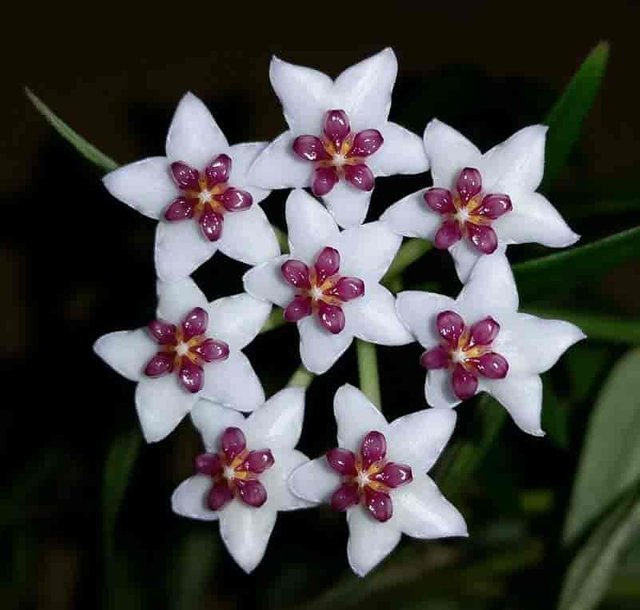
Native to tropic and subtropical regions, most hoyas do equally well in homes, in protected areas or a greenhouse. The hoyas that vine and climb do so by means of small stem rootlets, when untrained, they form a thick mat. Several species make beautiful baskets and look great on a small trellis.
Lighting – a north window is a good location. Although the plants do not require direct light, they would not do well away from a window, unless you prefer to grow them under fluorescent grow lights. Supply all but the hottest sun.Soil – a moist, well-drained, light soil – African Violet soil with some added perlite – is a good growing medium.
Watering – keep the soil moist in spring and summer, dry but not to the point of shriveled foliage in winter. In dry climates more frequent watering may be necessary.
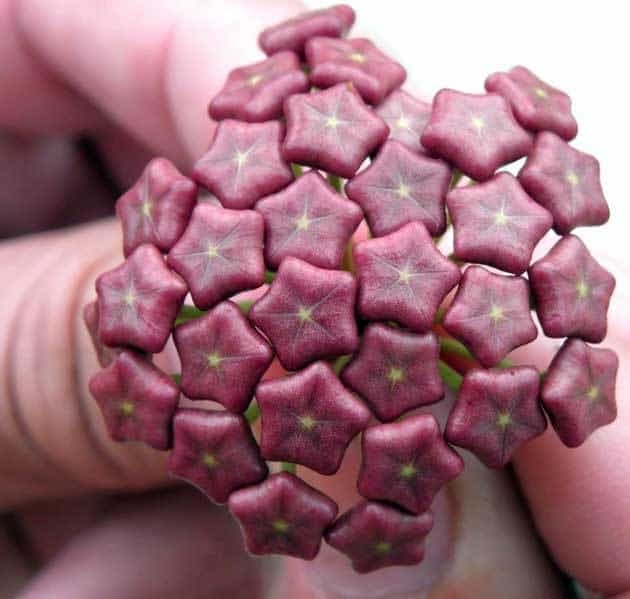
Some like to mist the leaves frequently, to clean them and increase humidity… but NOT when the plant is budding or in flower.
Temperature – give them medium (50 degrees) to warm temperatures during the growing season—spring and summer. The plants go semi-dormant in winter.
Fertilizer – In spring hoyas react favorably to feeding. Fertilize using a liquid balanced food, about every four weeks, three or four times during the growing season will produce a vigorous growth. Withhold food during the winter. More on applying liquid plant foods here.

Downvoting a post can decrease pending rewards and make it less visible. Common reasons:
Submit
Downvoting a post can decrease pending rewards and make it less visible. Common reasons:
Submit
Hoyas are evergreen perennial creepers or vines or rarely, shrubs.Common names for this genus are waxplant, waxvine, waxflower or simply hoya.



This genus was named by botanist Robert Brown, in honour of his friend, botanist Thomas Hoy.
Larger species grow 1–18 m (3–59 ft), or more, with suitable support in trees. They have simple entire leaves, arranged in an opposite pattern, that are typically succulent.
Hoya flowers are all shaped like five pointed stars. Some of the species' petals reflex so far that the flowers appear to be round or ball-like.
Hoya carnosa has been shown in recent studies at the University of Georgia to be an excellent remover of pollutants in the indoor environment.
Various cultures have used hoyas medicinally, especially Polynesian cultures.Some are toxic to livestock and sheep poisonings in Australia are reported.
That's all from me for you @ctrl-alt-nwo sir.
Information source-https://en.wikipedia.org/wiki/Hoya
Downvoting a post can decrease pending rewards and make it less visible. Common reasons:
Submit
Downvoting a post can decrease pending rewards and make it less visible. Common reasons:
Submit
Hoya is a genus of tropical plants in the Asclepiad family. Most people when they think of Hoyasthey automatically think of Hoya carnosa,


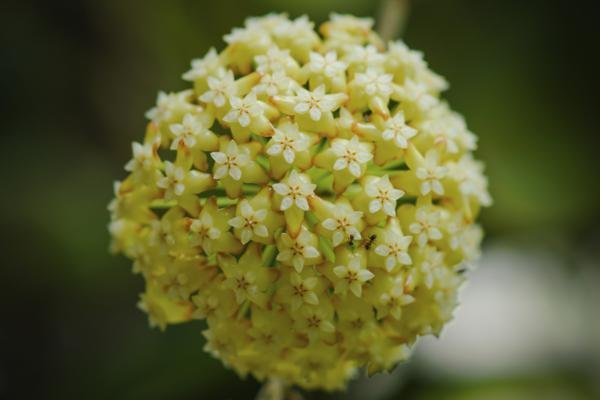
more commonly known as ìGrandmaís Old Fashioned Wax Plantî, and let it rest at that.
Robert Brown named Hoya in honour of his friend and fellow botanist Thomas Hoy, who was employed as head gardener by Duke of Northumberland at his estate, Sion House. There is no record of Thomas Hoyës ever having grown a Hoyabut then he, being a gardener must have, seen that his boss collected rare tropical plants.
H. carnosa has been in cultivation for more than 200 years and has given rise to many cultivars that vary in foliage form or flower color. In cultivation in the UK it has gained the Royal Horticultural Society’s Award of Garden Merit.
On a concluding note, gardening enthusiasts can easily find a Hoya variety that produces ornate leaves and vibrant-colored flowers that are fragrant. All you need to do is provide the plant bright, indirect light and fulfill other requirements pertaining to the soil type and quality, fertilizer, watering, etc.
I think you will like it @ctrl-alt-nwo sir.
Info from-https://gardenerdy.com/information-about-hoya-plant-varieties
Downvoting a post can decrease pending rewards and make it less visible. Common reasons:
Submit
latin name is hoya carnosa is one of the most beautiful flowers that can be grown at home. it is advisable to tie it on a wire or a rope because the neck is quite expansive and a climbing flower. Turkish name is probably taken because it has an interesting image as if it was made from the wax of flowers. Even though there are tiny flowers, the smell envelops the whole room. I think it has the potency to force the summit in the category of the most elegant flowers.
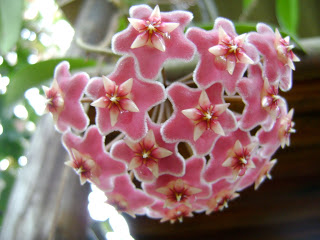
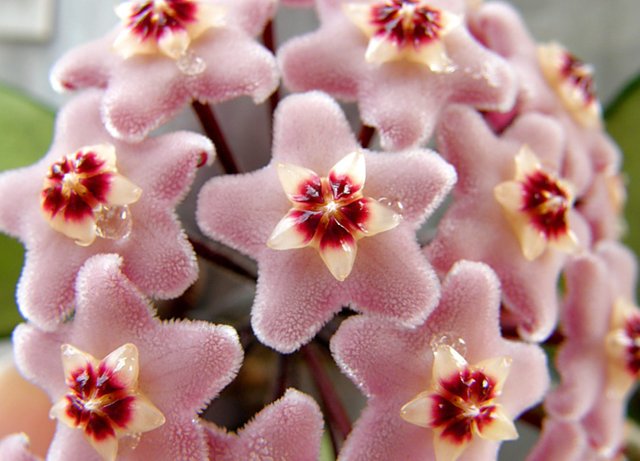
in terms of image-odor composition, will enforce the tops in the order to be made among the flowers; when the flowers open, blossoms will blink to the top with the taste of the syrup on the flowers. I have not mentioned the feeling of velvet you feel when you touch more flowers.
sight-smell-touch-how many flowers are alluded to from the senses.
I do not know if there is a flower that can function as natural room odor. The flowers look like flowers that make the leaves too.
It is not alone that everywhere and everybody does not bloom. he must be satisfied with the place and with him. otherwise it will grow long but will not bloom. It is soulful.
Downvoting a post can decrease pending rewards and make it less visible. Common reasons:
Submit
Magoo-2 found a series of multi accounts of a same owner is following your articles to cheat your generous rewards.
Magoo-2 found these accounts are suspicious & can be multi accounts of a single owner. Conclusion is based on last 30 days transactions:
@justdothat
@harunbaki
@justshowme
@gifhy
@lessismoring
magoo-2
Check our latest multi comment spam update report
Downvoting a post can decrease pending rewards and make it less visible. Common reasons:
Submit
Downvoting a post can decrease pending rewards and make it less visible. Common reasons:
Submit
This is very beautiful garden and beautiful photography.
thanks @ctrl-alt-nwo
Have a great day.
Downvoting a post can decrease pending rewards and make it less visible. Common reasons:
Submit
You have many followers . They collect different data about hoya.. I also collect different data about hoya about cultivation process of hoya..
Native to tropic and subtropical regions, most hoyas do equally well in homes, in protected areas or a greenhouse. The hoyas that vine and climb do so by means of small stem rootlets, when untrained, they form a thick mat. Several species make beautiful baskets and look great on a small trellis.
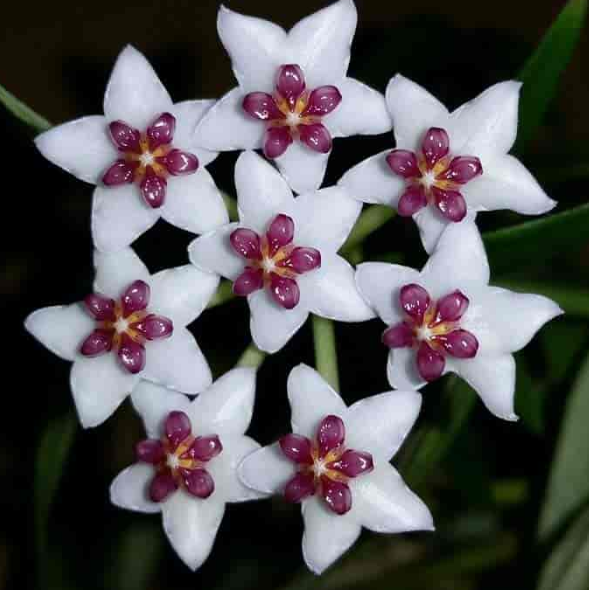
#Lighting – a north window is a good location. Although the plants do not require direct light, they would not do well away from a window, unless you prefer to grow them under fluorescent grow lights. Supply all but the hottest sun.
hoya-varigeated-809
#Soil – a moist, well-drained, light soil – African Violet soil with some added perlite – is a good growing medium.
#Watering – keep the soil moist in spring and summer, dry but not to the point of shriveled foliage in winter. In dry climates more frequent watering may be necessary.
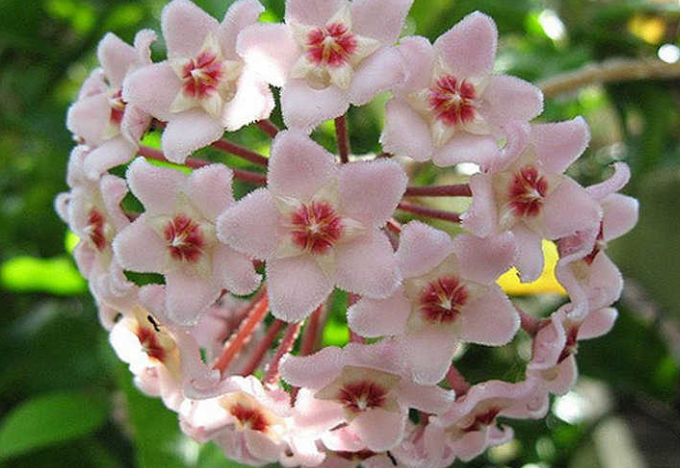
Some like to mist the leaves frequently, to clean them and increase humidity… but NOT when the plant is budding or in flower.
#Temperature – give them medium (50 degrees) to warm temperatures during the growing season—spring and summer. The plants go semi-dormant in winter.
#Fertilizer – In spring hoyas react favorably to feeding. Fertilize using a liquid balanced food, about every four weeks, three or four times during the growing season will produce a vigorous growth. Withhold food during the winter.
Downvoting a post can decrease pending rewards and make it less visible. Common reasons:
Submit
Hoya carnosa, the porcelainflower or wax plant, is an Asclepiad species of flowering plant in the dogbane family Apocynaceae. It is one of the many species of hoya that are native to Eastern Asia and Australia. It is a common house plant grown for its attractive waxy foliage, and sweetly scented flowers.
Though many swear Hoya plant care is among the easiest of all indoor plants, we’ve cared for many Hoyas in the nursery over the years, and have learned that each has its specific likes and dislikes. Here are 5 of our favorite Hoya cultivars and their care requirements. We’ll move through from most to least common, so you can master the ins and outs of Hoya plant care. Plus, we’ll share a tip to induce blossoming.
The flowers are typically light pink, but may vary from near-white to dark pink; they are star-shaped, and are borne in clusters that look like tiny wax miniatures. The surface of the flowers is covered in tiny hairs giving them a fuzzy sheen. They are heavily scented and may produce excess nectar that drips from the flowers. Like all Hoyas, this species flowers from specialized perennial structures referred to as spurs. These appear from the axils of the leaves and stem; flowers may not be produced when the spurs first appear, but in time buds emerge from the tips. Each season new flowers are produced on these same spurs, so they should not be damaged or removed.
H. carnosa has been in cultivation for more than 200 years and has given rise to many cultivars that vary in foliage form or flower color. In cultivation in the UK it has gained the Royal Horticultural Society’s Award of Garden Merit.
Recent studies at the University of Georgia have shown H. carnosa to be an excellent remover of pollutants in the indoor environment.
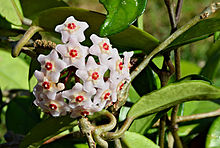
Downvoting a post can decrease pending rewards and make it less visible. Common reasons:
Submit
Hoya Plant Care: How to Grow Our Top 5 Cultivars
Posted on Jan 12, 2015 in Nursery | 230 Comments
If you remember a vine creeping around your grandmother’s kitchen, chances are it was a Hoya plant. This tropical indoor plant — often called a “Wax plant” due to its thick waxy leaves — is a classic because it lives forever, grows to be enormous, and creates beautiful, porcelain-like fragrant flower clusters (it’s also often called “Porcelain flower”).
Though many swear Hoya plant care is among the easiest of all indoor plants, we’ve cared for many Hoyas in the nursery over the years, and have learned that each has its specific likes and dislikes. Here are 5 of our favorite Hoya cultivars and their care requirements. We’ll move through from most to least common, so you can master the ins and outs of Hoya plant care. Plus, we’ll share a tip to induce blossoming!
Downvoting a post can decrease pending rewards and make it less visible. Common reasons:
Submit
Chamelaucium
Chamelaucium, also known as waxflower, is a genus of shrubs endemic to south western Western Australia. They belong to the myrtle family Myrtaceae and have flowers similar to those of the tea-trees (Leptospermum). The most well-known species is the Geraldton Wax, Chamelaucium uncinatum, which is cultivated widely for its large attractive flowers.
Description
Plants of the genus Chamelaucium are woody evergreen shrubs ranging from 15 cm (6 in) to 3 m (10 ft) high. The leaves are tiny to medium-sized and arranged oppositely on the stems. They contain oil glands and are aromatic,[1] often giving off a pleasant aroma when crushed. The flowers are small and have five petals, ten stamens, and are followed by small hardened fruit.[2]
Taxonomy
The genus was first defined by French botanist René Louiche Desfontaines in 1819.[3] The derivation of the name is unclear. They are commonly known as waxplants,[1] or wax flowers from the waxy feel of the petals.[2] Fourteen species are currently recognised within the genus. It gives its name to a number of closely related genera, collectively known as the Chamelaucium alliance within the family Myrtaceae; larger members include Verticordia, Calytrix, Darwinia, Micromyrtus, Thryptomene and Baeckea.[4]
Distribution and habitat
Restricted to the southwest of Western Australia, Chamelaucium species grow most commonly in heathland communities growing on sand near the coast or inland, and in granite outcrops. Some grow in more semi arid climates.[2]
Cultivation
In cultivation, they do well in dryer climates with good drainage and sunny aspect. They are hardy to frost and drought, although sensitive to Phytophthora cinnamomi.[2] The best known and most widely cultivated member of the genus by far is C. uncinatum, which is widely grown in gardens across southern Australia, and for the cut flower industry in the USA and Israel.[6]
https://steemit.com/hoya/@ctrl-alt-nwo/all-hail-the-hoya
Downvoting a post can decrease pending rewards and make it less visible. Common reasons:
Submit
Hoya, the porcelainflower or wax plant, is an Asclepiad species of flowering plant in the dogbane family Apocynaceae. It is one of the many species of hoya that are native to Eastern Asia and Australia. It is a common house plant grown for its attractive waxy foliage, and sweetly scented flowers.
You may prefer to call the plants by one of their other common names, including the wax plant, waxflower, Indian rope plant, porcelain flower, or honey plant.
Hoya flowers grow in a ball-shaped cluster, similar to mophead hydrangeas. Each cluster may contain up to 40 individual flowers, packed tightly together.
Hoya plants don’t ask for much, beyond the well-draining soil and the warm, humid conditions that many tropical flowers crave. You can grow the hoya if you live in USDA growing zones 10-12, elsewhere you must grow it as a tropical container plant or greenhouse specimen.
When your hoya plant finishes blooming, leave the flower stalk, as it may produce new flowers. Removing the stalk forces the plant to produce a new stalk, which delays blooming and wastes the plant’s energy.
Although we can thank the Scottish botanist Robert Brown for introducing the Asian native, Hoya into cultivation, the plant genus is named in honor of the 18th-century botanist Thomas Hoy.
#Source:Google
Downvoting a post can decrease pending rewards and make it less visible. Common reasons:
Submit
If you are planning to grow this plant in your garden, you can select a variety, depending on the color of the blooms or the growth habit. The ones with a twining or trailing habit can be grown in hanging baskets.
Hoya kerrii:
Heart or Valentine hoya is native to China and Thailand. The plant has succulent leaves. The veins are not visible on the heart-shaped leaves, as they are very thick and fleshy. It has a twining habit and would be perfect for a trellis.
Hoya multiflora:
Also referred to as the 'Shooting star' hoya, this species produces clusters of star-shaped white and yellow flowers that bend backwards. The leaves are dark green in color and are large, thick, and waxy. This plant grows well indoors.
Hoya carnosa:
Very popular among gardening enthusiasts, Hoya carnosa has thick, glossy leaves that are about 6-10 cm in length and 4-6 cm in width. The plant can grow up to a height of 15 feet. Its popularity is often attributed to its sweet fragrance. Each umbrel has about 20-30 flowers.
Hoya Bella:
Hoya Bella has creamy white, star-shaped flowers, with purple at the center. The leaves could be dark/bright green or variegated cream and green. This variety has a twining habit. It will produce blooms throughout the summer, if it gets bright, indirect sunlight.
Hoya bilobata:
Hoya bilobata is well-suited for trellis or hanging baskets. This plant produces small, glabrous leaves. It produces small flowers. The flowers have a faint scent.
Downvoting a post can decrease pending rewards and make it less visible. Common reasons:
Submit
A study conducted at the University of Georgia revealed that Hoya carnosa, which is the most popular species of hoya, has the ability to remove pollutants from the indoor environment.
The genus Hoya was named by Robert Brown, a Scottish botanist and palaeobotanist who is well-known for his contributions to the field of botany, especially plant taxonomy.
Hoya plants are also referred to as wax plants, wax flowers, or wax vines due to their waxy foliage and porcelain-like blooms. When cut, clear or milky sap oozes out.
Native to India, China, Thailand, Malaysia, Indonesia, Philippines, Polynesia, New Guinea, and Australia. Sun in the morning hours and bright, indirect light for the rest of the day is very good for the plant.
On a concluding note, gardening enthusiasts can easily find a Hoya variety that produces ornate leaves and vibrant-colored flowers that are fragrant. All you need to do is provide the plant bright, indirect light and fulfill other requirements pertaining to the soil type and quality, fertilizer, watering, etc.
Source:gardenerdy.com
Downvoting a post can decrease pending rewards and make it less visible. Common reasons:
Submit
beautiful flower photography...😍 here is plants beautiful hoya ☺
Downvoting a post can decrease pending rewards and make it less visible. Common reasons:
Submit
The blossoms of this plant are consummately geometrical, which is one reason that the plant looks fake upon first look. I never knew much about Hoyas; indeed, I just as of late took in their actual name. They are stunning wonders that are in numerous homes. They are anything but difficult to deal with and they add a fascinating touch to any home garden. Here's some of what I've found out about this uncommon plant.
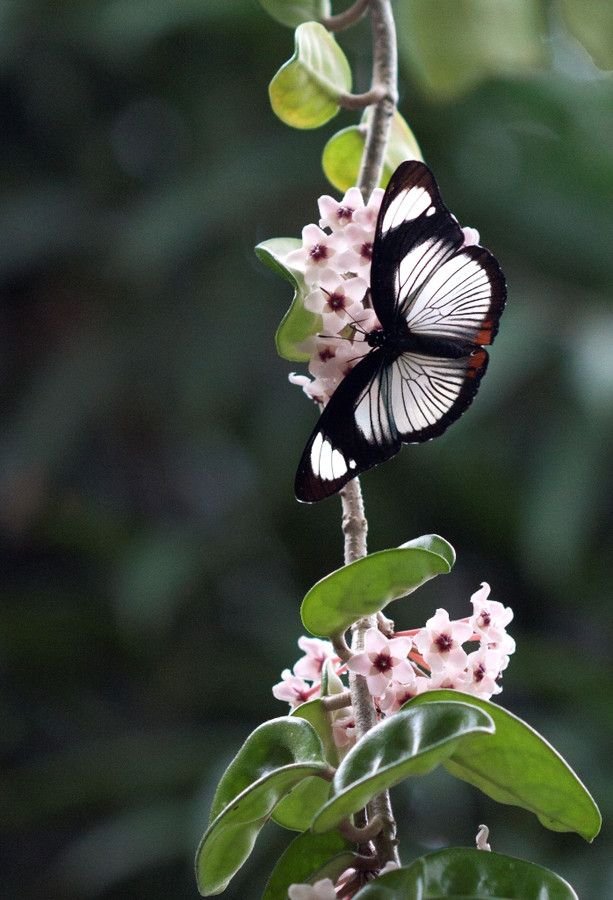
Downvoting a post can decrease pending rewards and make it less visible. Common reasons:
Submit
The flowers on a hoya plant are small and precise. Each blossom consists of five, waxy shiny like porcelain light-pink petals in the shape of a star. Some sporting a single droplet of nectar. The leaves may be furry or fleshy, shiny or matte, heart-shaped or oval, large as a plate or small as a penny. Varieties of the succulent flower have flowers of pink, yellow, orange and burgundy, not to mention white and near-black.
Source
Source
Source
Hoyas are tree climbers that like fast-draining, almost soilless conditions. In the wild, hoyas can stretch 100 feet up to the canopy.
A hidden benefit if you can keep the plant happy indoors: Hoya carnosa is one of five "super ornamentals" that remove volatile organic compounds such as benzene and toulene from indoor air, according to a 2009 University of Georgia study.
Source
Source
Once you've got your hoya, it should be planted in a light mix, half perlite or vermiculite, and half potting soil. After the flowers drop, don't deadhead a hoya. Leave the spent flowers. The spurs where the flowers emerged will get a new flush the next year.
Text from multiple Google sources.
Downvoting a post can decrease pending rewards and make it less visible. Common reasons:
Submit
Hoyas are beloved & easy care houseplants. They come in a wide array of foliage colors, textures, patterns, shapes & sizes.
Some many beloved Hoyas, so little room! There are over 200 species of Hoyas out there with a diverse array of foliage color and shape as well as flower color and form. These tropical plants, many of them epiphytic succulents, are vines and some are shrubs. All of them so very interesting in my book. I grow my Hoyas outdoors here in Santa Barbara but I’m giving care tips for them indoors too because they always have been and are now ever popular houseplants.
I love their fleshy, glossy leaves and their unique waxy flowers. I remember seeing quite a few of these twining plants in homes and greenhouses growing up In New England. Many of them were in hanging baskets and we had one that had trails which were at least 6′ long. Exotic as they are, they’re not hard to care for at all.
Source: https://www.joyusgarden.com/the-beloved-hoyas-care-and-repotting-tips/
Downvoting a post can decrease pending rewards and make it less visible. Common reasons:
Submit
If you remember a vine creeping around your grandmother’s kitchen, chances are it was a Hoya plant. This tropical plant — often called a “Wax plant” due to its thick waxy leaves — is a classic because it lives forever, grows to be enormous, and creates beautiful, porcelain-like fragrant flower clusters (it’s also often called “Porcelain flower”).
They are most often found growing as epiphytes in tropical forests where they climb up into or hang from the branches amongst the mix of other epiphytic plants. As they often grow lower in the canopy, as well as at the tops of the tress, they have a great adaption to varying light levels.
If you have a plant that hasn’t flowered and is quite old, try subjecting it to a dry, cool period during the winter while increasing the light level. Overall with a little attention, hoyas can give years of enjoyment with their waxy, sometimes fragrant, flowers and their green vining foliage that does well in low light.
Images Source
Text Source 1
Text Source 2
Downvoting a post can decrease pending rewards and make it less visible. Common reasons:
Submit
The flowers are a very special gift for us. The plants we look at are good, but they will bloom and seed in order to keep the seeds under bad conditions. Note that plant seeds have a special shape or feature for transporting them all to places in the country, a flail for some windmill, a feather for some fly, or a geometric shape for bringing water and rain to the proper place.
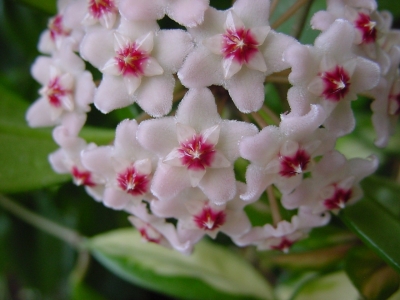
Let's go to Hoya flower:
4.Do not give any fertilizer.
Do not leave water on the plate, ventilate it with plenty of water, and dampen the top of the pot with your finger to check the moisture and dry the water, the leaves and buds will be forced to reduce the water. Do not worry it will be the one you want to give to the manure. You will be very grateful if you humid your leaves with any of the folks except the watering. with love.
Please tell your friends what they want and give while you are giving them the smell, they will give you very little or too much.
Source
Downvoting a post can decrease pending rewards and make it less visible. Common reasons:
Submit
Magoo-2 found a series of multi accounts of a same owner is following your articles to cheat your generous rewards.
Magoo-2 found these accounts are suspicious & can be multi accounts of a single owner. Conclusion is based on last 30 days transactions:
@justdothat
@harunbaki
@justshowme
@gifhy
@lessismoring
magoo-2
Check our latest multi comment spam update report
Downvoting a post can decrease pending rewards and make it less visible. Common reasons:
Submit
Downvoting a post can decrease pending rewards and make it less visible. Common reasons:
Submit
Many species of Hoya are popular houseplants in temperate areas (especially H. carnosa), grown for their attractive foliage and strongly scented flowers. Numerous cultivars have been selected for different leaf forms or flower colours. Hoyas grow well indoors, preferring bright light, but will tolerate fairly low light levels, although they may not flower without bright light. Hoyas commonly sold in nurseries as houseplants include cultivars of H. carnosa (Krimson Queen, Hindu Rope − compacta), H. pubicalyx (often mislabelled as H. carnosa or H. purpurea-fusca), and H. kerrii. Hoyas are easy to propagate, and are commonly sold as cuttings, either rooted or unrooted, or as a potted plant.
Hoya carnosa has been shown in recent studies at the University of Georgia to be an excellent remover of pollutants in the indoor environment.[citation needed]
Various cultures have used hoyas medicinally, especially Polynesian cultures.[citation needed] Some are toxic to livestock and sheep poisonings in Australia are reported.[citation needed]
Several Hoya species and cultivars are excellent terrarium plants.
Hoya campanulata
Hoya cinnamomifolia
Hoya imperialis
Hoya parasitica
Hoya pottsii
Sourceall
Downvoting a post can decrease pending rewards and make it less visible. Common reasons:
Submit
Very beautiful plant hoya @ctrl-alt-nwo
Hoyas are evergreen perennial creepers or vines or rarely, shrubs. They often grow epiphytically on trees; some grow terrestrially, or occasionally in rocky areas. They climb by twining, and with the employment of adventitious roots. Larger species grow 1–18 m (3–59 ft), or more, with suitable support in trees. They have simple entire leaves, arranged in an opposite pattern, that are typically succulent. Leaves may exhibit a variety of forms, and may be smooth, felted or hairy; veination may be prominent or not, and many species have leaf surfaces flecked with irregular small silvery spots.

The flowers appear in axillary umbellate clusters at the tip of peduncles. Hoya peduncles are commonly referred to as spurs. In most species these spurs are perennial and are rarely shed. Each flowering cycle increases the length of the spur, and in the larger species can eventually reach 27 cm (11 in) or more. Flowers vary in size from 3 mm (0.1 in) (Hoya bilobata Schltr.) to over 95 mm (4 in) (in H. lauterbachii K. Schuman) in diameter. Flower form is typically star-shaped, with five thick, waxy, triangular petals, topped with another star-shaped structure, the corona. Colours on most species range from white to pink; there are species that exhibit yellow to orange, dark reds to near-black, and there are green flowers. Many are sweetly scented. and most produce abundant nectar.

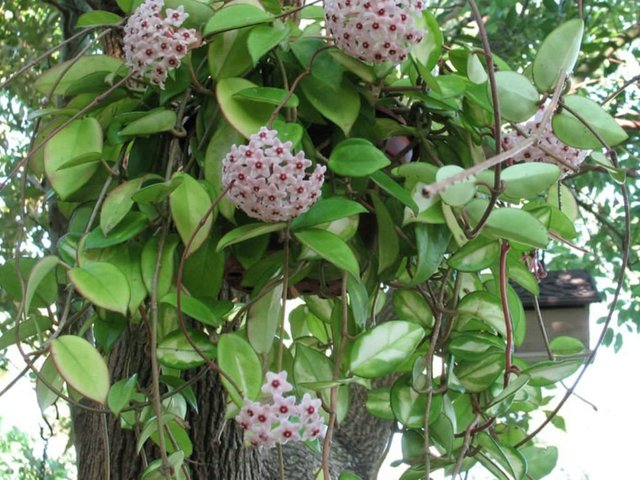
#sourceall
Downvoting a post can decrease pending rewards and make it less visible. Common reasons:
Submit
Amazing plant, he has a very complex inflorescence. Hoya, "waxy flower"
He owns more than 200 species of plants originating from southern Asia and Australia. Often called "waxy flower" because of waxy leaves and flowers. However, it should not be confused with the chamaelaucium uncinatum used in cut form.
Hoya - it's creeping or curly bushes with long-standing flowers in the form of asterisks. Hoyu, as a rule, is grown indoors, but in places with a suitable climate it can be planted and on the street. Know how to plant bella in pendant pots, Hoya
In general, Hoya carnosa is easier to grow, but plants do not tolerate movement from place to place. In summer, liquid fertilizer is periodically added to the irrigation water with a nitrogen: phosphorus: potassium ratio of 3: 2: 1, at a rate of 0.5 grams per liter. Hoya prefers good lighting without direct sunlight that causes leaf burns. the whole is a very beautiful plant for home and oranges. Thanks for the interesting post, where I learn a lot of new things.
http://www.treeland.ru/article/home/plant/Hoya-wax-flower
Downvoting a post can decrease pending rewards and make it less visible. Common reasons:
Submit
WaxFlower
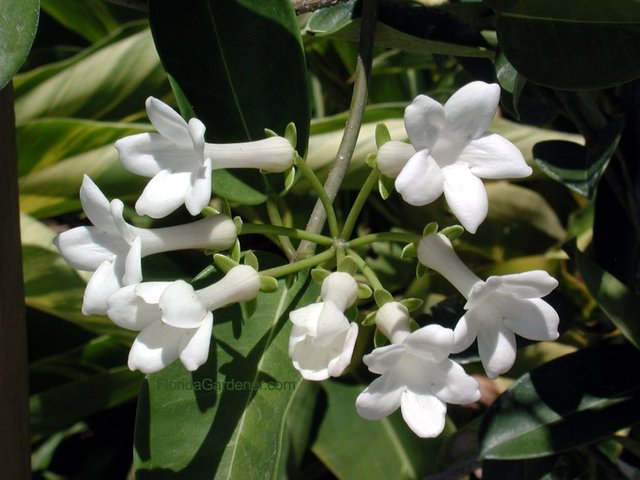
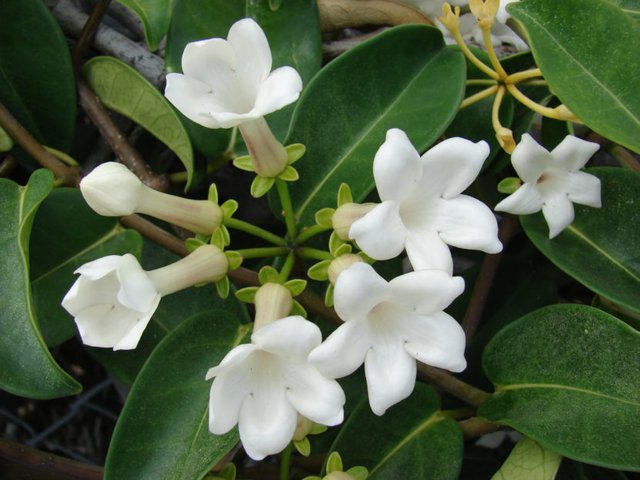
Wax Flower makes an attractive addition to wedding arrangements! To the left, select the date range in which your event falls to see which varieties are available. Wax Flower is a flowering shrub that has multiple blooms per stem, making it a wonderful choice for a filler flower. These romantic, long lasting blooms, symbolize lasting success and have been used in wedding bouquets and centerpieces as a sign of lasting love and patience.
Downvoting a post can decrease pending rewards and make it less visible. Common reasons:
Submit
This is great article and wonderful photography.
@ctrl-alt-nwo
Upvote Resteem
Downvoting a post can decrease pending rewards and make it less visible. Common reasons:
Submit
The blooms of this plant are perfectly geometrical, which is one of the reasons that the plant looks artificial upon first glance. I never knew much about Hoyas; in fact, I only recently learned their true name. They are breathtaking beauties that are in many homes. They are easy to take care of and they add an exotic touch to any home garden. Here’s some of what I’ve learned about this extraordinary plant.
There are over 200 species of Hoyas, each of which have unique colors and shapes. This beauty is seen not only in the blooms, but in the foliage as well. Hoyas are popular house plants that often bloom in the first year, but if they are indoor plants, there is a possibility that the process could take longer. Let’s explore some of the specific needs of Hoya plants; starting at the roots of the plant and the type of soil that is needed to help them grow.
The best way to propagate a Hoya plant is to create a cutting that is at least ten centimeters long. The cutting should have two to six leaves, and it should be removed from the matured plant during the early spring of the year. This allows the new plant to take root during the growing season, which will help it survive. You can place the cutting in water and wait for the roots to form or you can transplant it directly into dirt.
source: http://www.gardenloversclub.com/houseplants/hoya-plant/growing-hoya-plants/
Downvoting a post can decrease pending rewards and make it less visible. Common reasons:
Submit
I’ve grown Hoya for years outside in Florida, from Orlando north to Jacksonville. They are cold sensitive, but wrapping with a sheet keeps them safe in all but freezing weather. The do well in the hanging iron baskets with husk bowls and simple potting mix. They seem to need bright light to bloom, morning sun or dappled shade only.
The Curly Rope Hoya is a harder-to-find carnosa.
It’s hard to predict when these plants will flower, as it occurs when the plants reach maturity. When are they mature? Depends on the growing conditions! But rumor has it that keeping your plant tightly root-bound (in a smaller than normal pot) will accelerate blossoming. Don’t down-pot your plant, though (take it from a big pot and place in a smaller pot) as that can shock your Hoya, a no-no in Hoya plant care.
Hoya plants (Hoya carnosa) are also commonly known as wax plants because their leaves and flowers look like they are carved from wax. While they can be grown outdoors in USDA Hardiness Zones 9 to 11 (meaning they can stand temperatures that dip down to 20 degrees Fahrenheit, or -3.9 degrees Celsius),[1] they are most commonly grown indoors. This species is one of the easiest flowering houseplants to grow successfully. Their long, trailing stems can be trained to grow up a small trellis or the plant can be grown in a hanging container with the long stems dangling down.[2] When Hoya plants get big enough, they will produce round umbels or clusters of star-shaped flowers.
Giving Your Hoya Light and Water

Pick out a bright spot for your Hoya. In particular, look for a spot near an east- or west-facing window. Hoyas do best in bright, indirect sunlight throughout the day, though they also prefer to have two to four hours of direct sunlight.[3]
A south-facing window is also okay as long as there is a sheer curtain hanging between the window and the Hoya plant. Hot, direct sunlight all day is too much for these plants.
Move your older plant if it has stopped blooming as much. A two- to three-year old plant that does not bloom is probably not getting enough sunlight. If this occurs, try exposing it to another hour or two of direct sunlight.
Move your older plant if it has stopped blooming as much. A two- to three-year old plant that does not bloom is probably not getting enough sunlight. If this occurs, try exposing it to another hour or two of direct sunlight.
Downvoting a post can decrease pending rewards and make it less visible. Common reasons:
Submit
Though many swear Hoya plant care is among the easiest of all indoor plants, we’ve cared for many Hoyas in the nursery over the years, and have learned that each has its specific likes and dislikes. Here are 5 of our favorite Hoya cultivars and their care requirements. We’ll move through from most to least common, so you can master the ins and outs of Hoya plant care. Plus, we’ll share a tip to induce blossoming!
Downvoting a post can decrease pending rewards and make it less visible. Common reasons:
Submit
Please choose your cut and paste carefully, incomplete info. and no pics !
Downvoting a post can decrease pending rewards and make it less visible. Common reasons:
Submit
its really more colourfull flowers
symbol of love ♥
Downvoting a post can decrease pending rewards and make it less visible. Common reasons:
Submit
How to Take Care of Hoya Flower
Hoya flower is a very beautiful flower. Hoya flowers can grow as high as 3 meters. Hoya flower in addition to beautiful, also produces fragrant scent. If you look cursoryly, Hoya ornamental plants are not like native plants.
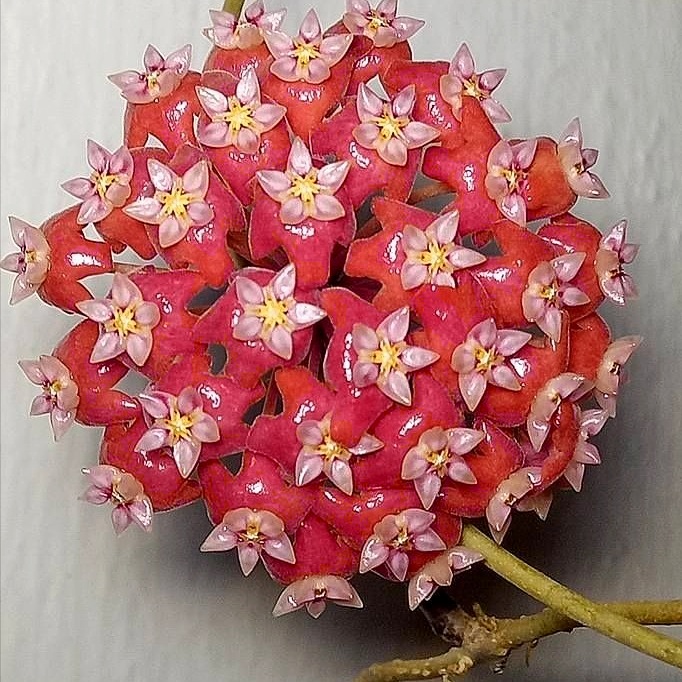
There are many variants of the more popular Hoya species lately, the hybrid species and the original reach 1000 species.
How to care for it, Hoya flowers require a lot of sun intake exactly 14 hours a day. Watering is recommended to wait for the soil to dry, try the pot has a good drainage system so Hoya flowers can grow well.
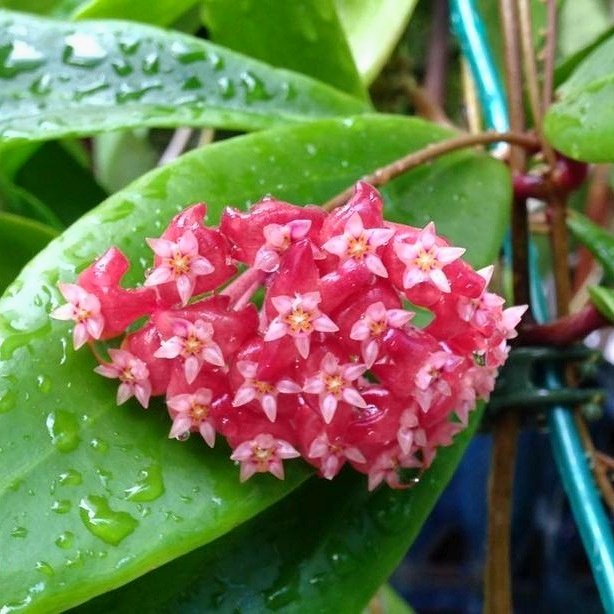
Hoya ornamental plants are very fast growing. Therefore, you can cut the leaves if it is too much. Do not prun the stems that are not leafy or the stems where the flowers grow, because hoya flowers will grow on the same stem repeatedly.
Thank you!
Downvoting a post can decrease pending rewards and make it less visible. Common reasons:
Submit
Magoo-2 found a series of multi accounts of a same owner is following your articles to cheat your generous rewards.
Magoo-2 found these accounts are suspicious & can be multi accounts of a single owner. Conclusion is based on last 30 days transactions:
@seha76
@faisalrizal2018
@roman-sabil
magoo-2
Check our latest multi comment spam update report
Downvoting a post can decrease pending rewards and make it less visible. Common reasons:
Submit
Wow
really very looking garden photography post...
Amazing 🌸flower...
I like this it...
Thanks for sharing....
Downvoting a post can decrease pending rewards and make it less visible. Common reasons:
Submit
magoo-2 found a series of multi accounts of a same owner is following your articles to cheat your generous rewards.
magoo-2 found these accounts are suspicious & can be multi accounts of a single owner. Conclusion is based on last 30 days transactions:
@triptybarsha
@rakib786
@sujonkhan
@sujonmia
@imamulkhan
magoo-2
Check our latest multi comment spam update report
Downvoting a post can decrease pending rewards and make it less visible. Common reasons:
Submit
Downvoting a post can decrease pending rewards and make it less visible. Common reasons:
Submit
Hoya carnosa
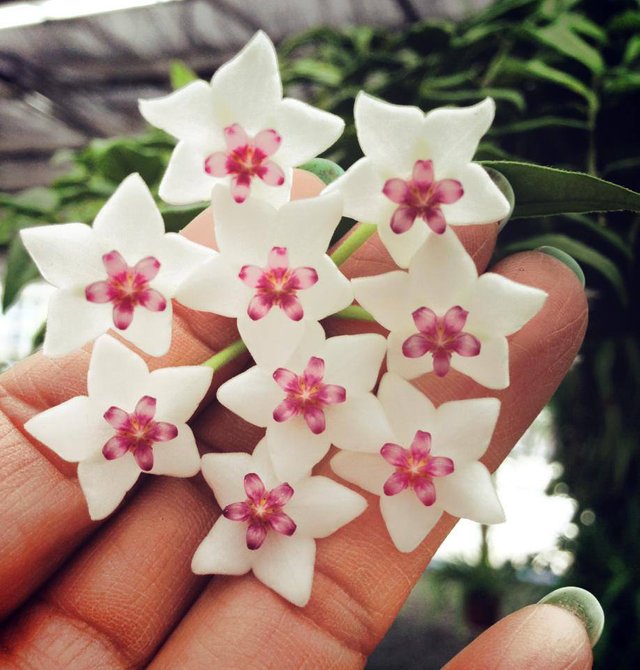
Hoya carnosa, the porcelainflower or wax plant, is an Asclepiad species of flowering plant in the dogbane family Apocynaceae. It is one of the many species of hoya that are native to Eastern Asia and Australia. It is a common house plant grown for its attractive waxy foliage, and sweetly scented flowers.
The flowers are typically light pink, but may vary from near-white to dark pink; they are star-shaped, and are borne in clusters that look like tiny wax miniatures. The surface of the flowers is covered in tiny hairs giving them a fuzzy sheen. They are heavily scented and may produce excess nectar that drips from the flowers. Like all Hoyas, this species flowers from specialized perennial structures referred to as spurs. These appear from the axils of the leaves and stem; flowers may not be produced when the spurs first appear, but in time buds emerge from the tips. Each season new flowers are produced on these same spurs, so they should not be damaged or removed.
H. carnosa has been in cultivation for more than 200 years and has given rise to many cultivars that vary in foliage form or flower color. In cultivation in the UK it has gained the Royal Horticultural Society’s Award of Garden Merit.[1][2]
Recent studies at the University of Georgia have shown H. carnosa to be an excellent remover of pollutants in the indoor environment.[3
Cultivation
This Hoya species prefers bright light, but will tolerate much less. Though it will tolerate low temperatures (but not freezing),[1] the optimal temperature is 60–85 °F (16–29 °C). It can be propagated by air layering or by stem cuttings.[4] It benefits from an open potting medium that allows some air to get to the roots. Typical mixes include large-grade drainage material such as perlite, pumice, or ceramic balls. The plants should be fed regularly with a fertilizer suitable for epiphytic plants.
There is a persistent piece of folklore that hoyas prefer to be potbound - kept in a small pot. It is said that this will hasten flowering.[5]
https://en.wikipedia.org/wiki/Hoya_carnosa
Downvoting a post can decrease pending rewards and make it less visible. Common reasons:
Submit
magoo-2 found a series of multi accounts of a same owner is following your articles to cheat your generous rewards.
magoo-2 found these accounts are suspicious & can be multi accounts of a single owner. Conclusion is based on last 30 days transactions:
@rik432
@ratul8940
@rahul72
@taylor10
@villani
@wilson6
@masud90
@purepinag
@sumonsha
@perry1
@max1994
magoo-2
Check our latest multi comment spam update report
Downvoting a post can decrease pending rewards and make it less visible. Common reasons:
Submit
Waxflower looks awesome sir thanks a lot for sharing have a great day.
Downvoting a post can decrease pending rewards and make it less visible. Common reasons:
Submit
Magoo-2 found a series of multi accounts of a same owner is following your articles to cheat your generous rewards.
Magoo-2 found these accounts are suspicious & can be multi accounts of a single owner. Conclusion is based on last 30 days transactions:
@saikr
@christian.danny
@aaeesha
magoo-2
Check our latest multi comment spam update report
Downvoting a post can decrease pending rewards and make it less visible. Common reasons:
Submit
Downvoting a post can decrease pending rewards and make it less visible. Common reasons:
Submit
@ctrl-alt-nwo
The waxflower is a shrub more commonly known as the Geraldton wax. This is in honour of the Australian town of Geraldton, where it is thought to originate. The Latin name for the plant is chamelaucium uncinatum, with the word uncinatum coming from the Latin for hooked. It is called this because of the tip of the leaves appear to hook over themselves when growing
The plant is an upright shrub which can grow as high as four metres. During the summer and autumn, it displays small round petal flowers. Waxflower blooms with pink, purple white or red flowers and as such is a very popular choice for cut flowers. It also has a sweet almond and lemon fragrance, which is another reason why it is so popular as a cut-flower choice.
Waxflower is indigenous to Western Australia, where it enjoys a warm, dry climate. It is a fairly hardy plant and although it can live in subtropical environments, high humidity levels will harm it.
100% like and resteem
Downvoting a post can decrease pending rewards and make it less visible. Common reasons:
Submit
Hoya is awesome sir thanks a lot for sharing such amazing plant have a great day sir.
Downvoting a post can decrease pending rewards and make it less visible. Common reasons:
Submit
Magoo-2 found a series of multi accounts of a same owner is following your articles to cheat your generous rewards.
Magoo-2 found these accounts are suspicious & can be multi accounts of a single owner. Conclusion is based on last 30 days transactions:
@saikr
@christian.danny
@aaeesha
@sarah.taylor
magoo-2
Check our latest multi comment spam update report
Downvoting a post can decrease pending rewards and make it less visible. Common reasons:
Submit
Downvoting a post can decrease pending rewards and make it less visible. Common reasons:
Submit
@ctrl-alt-nwo - Sir this Waxflower looks beautiful & you shared valuable information about that flower... Thank you Sir... It's truly valuable for the gardening...
+W+
Downvoting a post can decrease pending rewards and make it less visible. Common reasons:
Submit
@ctrl-alt-nwo,
It seems to be a well suited plant for Balconies and Walls! I don't know whether I have seen this in my country or not! But I can assure I have seen something similar to this one! Nice photography and description!
Cheers~
Downvoting a post can decrease pending rewards and make it less visible. Common reasons:
Submit
@ctrl-alt-nwo
Wow fantastic garden . wonderful work. i like this Lantana trees and flowers
Downvoting a post can decrease pending rewards and make it less visible. Common reasons:
Submit
You have the wrong Waxflower here ! this is not Hoya, it's an Eriostemon, a native Australian plant which also has the common name of Waxflower. Be careful of Common names.
Downvoting a post can decrease pending rewards and make it less visible. Common reasons:
Submit
Hoya should be hailed with great respect such an amazing plant this is,great work sir in presenting these plants.
Downvoting a post can decrease pending rewards and make it less visible. Common reasons:
Submit
Magoo-2 found a series of multi accounts of a same owner is following your articles to cheat your generous rewards.
Magoo-2 found these accounts are suspicious & can be multi accounts of a single owner. Conclusion is based on last 30 days transactions:
@saikr
@christian.danny
@aaeesha
@sarah.taylor
magoo-2
Check our latest multi comment spam update report
Downvoting a post can decrease pending rewards and make it less visible. Common reasons:
Submit
Downvoting a post can decrease pending rewards and make it less visible. Common reasons:
Submit
wow
its so gorgeous and interesting looking
really awesome and looking so great !
thanks for share
Downvoting a post can decrease pending rewards and make it less visible. Common reasons:
Submit
Magoo-2 found a series of multi accounts of a same owner is following your articles to cheat your generous rewards.
Magoo-2 found these accounts are suspicious & can be multi accounts of a single owner. Conclusion is based on last 30 days transactions:
@rahmanmdriad
@mdriadrahman26
@masterlegend
magoo-2
Check our latest multi comment spam update report
Downvoting a post can decrease pending rewards and make it less visible. Common reasons:
Submit
oh.its hoy
really pretty
so pure looks
marvelous
Downvoting a post can decrease pending rewards and make it less visible. Common reasons:
Submit
Magoo-2 found a series of multi accounts of a same owner is following your articles to cheat your generous rewards.
Magoo-2 found these accounts are suspicious & can be multi accounts of a single owner. Conclusion is based on last 30 days transactions:
@rahmanmdriad
@mdriadrahman26
@masterlegend
magoo-2
Check our latest multi comment spam update report
Downvoting a post can decrease pending rewards and make it less visible. Common reasons:
Submit
Good morning!! It’s so nice to see your new post this morning! Hoya has very dainty white flowers! Hoya sounds like a Japanese lens sold in Thailand! The Japanese likes this plant too much!
Aha! They can be planted in a pot! This is really good fir a canopy in the place where we want some shade in the middle of the day! I shall have to investigate this!
Thank you very much.
Have a nice day.
Downvoting a post can decrease pending rewards and make it less visible. Common reasons:
Submit
They have really taken hold of that railing. The person who first planted them is probably very proud!
Downvoting a post can decrease pending rewards and make it less visible. Common reasons:
Submit
Too right.
Downvoting a post can decrease pending rewards and make it less visible. Common reasons:
Submit
This is a very beautiful climber plant you got there. I see it goes well with palm trees too.
Downvoting a post can decrease pending rewards and make it less visible. Common reasons:
Submit
😍😍😍 wow. Looks... sorry i lost the perfect word for it. All hail to Hoya!!
Downvoting a post can decrease pending rewards and make it less visible. Common reasons:
Submit
So beautiful garden, thanks for sharing
Resteem
Downvoting a post can decrease pending rewards and make it less visible. Common reasons:
Submit
its beautiful and amazing such a delight to see :)
Downvoting a post can decrease pending rewards and make it less visible. Common reasons:
Submit
Wow amazing & beautiful Lantana garden.
For your post propagation.
Upvote/Resteem
Downvoting a post can decrease pending rewards and make it less visible. Common reasons:
Submit
Lantana was the last post, this post is about Hoyas.
Downvoting a post can decrease pending rewards and make it less visible. Common reasons:
Submit
Wax Plant
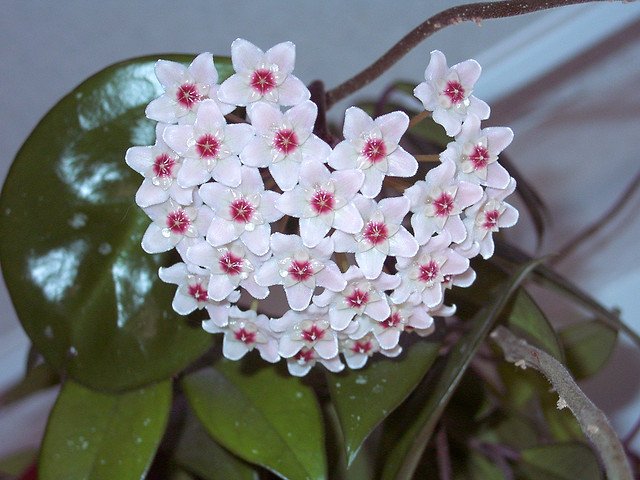
Hoya spp.
Wax Plant Plant Features
If you're looking for an exotic indoor plant that's very easy to grow, take a look at wax plant. This unique houseplant is a vine (but don't worry; it's not a fast-growing one!) that has thick, waxy leaves and clusters of star-shaped waxy flowers. It's among the most tolerant of all houseplants.
Wax plant is often sold in hanging baskets, but its lanky stems will trail from tall containers such as urns, too. Or, if you want to grow it upright, supply a trellis or totem and let wax plant supply vertical interest to your home or office.
Wax Plant Questions?
Our houseplant experts like talking with other indoor gardeners! If you have questions about wax plant, just send us an email! Or sign up for our monthly email newsletter to get more tips from our growers.
Wax Plant Growing Instructions
Grow wax plant in low, medium, or bright light. It tolerates low and medium light, but doesn't typically bloom in these conditions. Like most flowering houseplants, the more light wax plant gets, the more flowers it will produce.
Water wax plant when the potting mix dries out. Don't worry if you forget to water it once or twice --- wax plant doesn't mind. It thick leaves and stems help the plant store water for cases just like that.
Wax plant doesn't require a lot of fertilizer, but you can fertilize your wax plant if you want it to bloom better. Use any general-purpose houseplant fertilizer and follow the directions on the packaging.
Downvoting a post can decrease pending rewards and make it less visible. Common reasons:
Submit
Don't forget to quote your source.....
Downvoting a post can decrease pending rewards and make it less visible. Common reasons:
Submit
Waxflower is also known as Chamelaucium which is a shrub genus mostly seen at (endemic) South Western part of Western Australia. It is said that they belong to myrtle family of Myrtaceae and possess leaves similar to tea-trees. Among the flowers Geraldton Wax which is cultivated because of their appeal of large attractive flowers...
Downvoting a post can decrease pending rewards and make it less visible. Common reasons:
Submit
Magoo-2 found a series of multi accounts of a same owner is following your articles to cheat your generous rewards.
Magoo-2 found these accounts are suspicious & can be multi accounts of a single owner. Conclusion is based on last 30 days transactions:
@mumin007
@naqshab02
@muhasib
@sheikhiqra
@hariszahoor
@zahidmalik
@chaddiman
magoo-2
Check our latest multi comment spam update report
Downvoting a post can decrease pending rewards and make it less visible. Common reasons:
Submit
Downvoting a post can decrease pending rewards and make it less visible. Common reasons:
Submit
TheHoya:This genus was named by botanist Robert Brown, in honour of his friend, botanist Thomas Hoy.
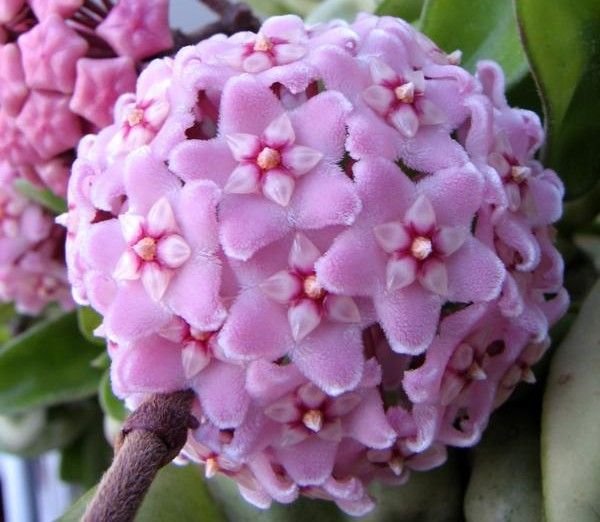
 )
)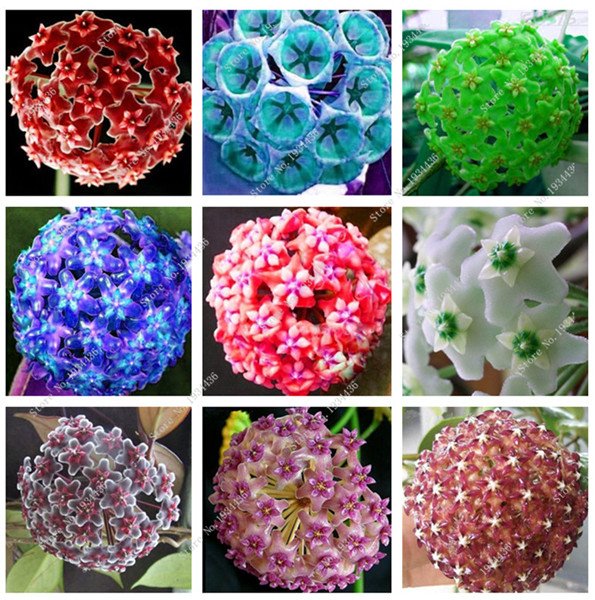
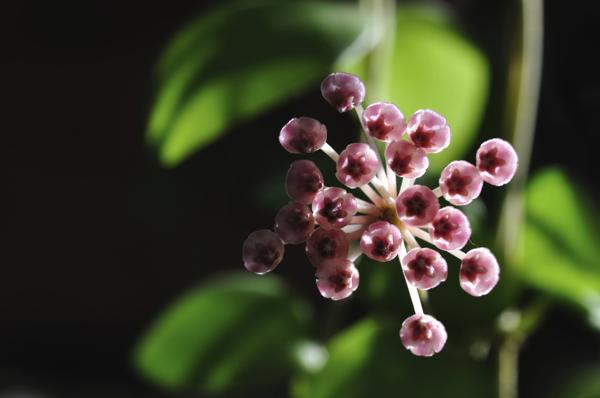
If you are planning to grow this plant in your garden, you can select a variety, depending on the color of the blooms or the growth habit. The ones with a twining or trailing habit can be grown in hanging baskets.
Hoya carnosa has thick, glossy leaves that are about 6-10 cm in length and 4-6 cm in width. The plant can grow up to a height of 15 feet.
![600-477874847-orange-hoya-flower.jpg]
Hoyas are native to Southern India, but can be found growing wild all over Southeastern Asia and Australia.(
Hoya carnosas are fairly low-maintenance, and with proper care can last for years and be passed down among generations.Hoya must be mature (3+ years old) in order to bloom.
Some are toxic to livestock and sheep.Many species of Hoya are popular houseplants in temperate areas grown for their attractive foliage and strongly scented flowers.
This is a beautiful flower tree.All the information i collected for you @ctrl-alt-nwo.Info collected from-https://en.wikipedia.org/wiki/Hoya
Downvoting a post can decrease pending rewards and make it less visible. Common reasons:
Submit
This post has been randomly selected and resteemed @steemeely
Good luck and have a great day.
Downvoting a post can decrease pending rewards and make it less visible. Common reasons:
Submit
Very nice post..
Downvoting a post can decrease pending rewards and make it less visible. Common reasons:
Submit
Magoo-2 found a series of multi accounts of a same owner is following your articles to cheat your generous rewards.
Magoo-2 found these accounts are suspicious & can be multi accounts of a single owner. Conclusion is based on last 30 days transactions:
@triptybarsha
@rakib786
@sujonkhan
@sujonmia
@imamulkhan
magoo-2
Check our latest multi comment spam update report
Downvoting a post can decrease pending rewards and make it less visible. Common reasons:
Submit
excellent photography & the garder is to beautiful.. of this colourful flower
Downvoting a post can decrease pending rewards and make it less visible. Common reasons:
Submit
They’re sturdy plants that can take shade, neglect, and relative cold household temperatures and still look healthy and happy.
Not only does it survive neglect and abuse, if you treat it right it will produce beautiful flowers
Downvoting a post can decrease pending rewards and make it less visible. Common reasons:
Submit
its nice to see you in a while.Beautiful flower you got there.
Downvoting a post can decrease pending rewards and make it less visible. Common reasons:
Submit
Amazing your photography. this is a very nice flower. i love flower........
Downvoting a post can decrease pending rewards and make it less visible. Common reasons:
Submit
Beautuful colors and contrast. It can make concrete more beautiful and natural.
Downvoting a post can decrease pending rewards and make it less visible. Common reasons:
Submit
nice post
Downvoting a post can decrease pending rewards and make it less visible. Common reasons:
Submit